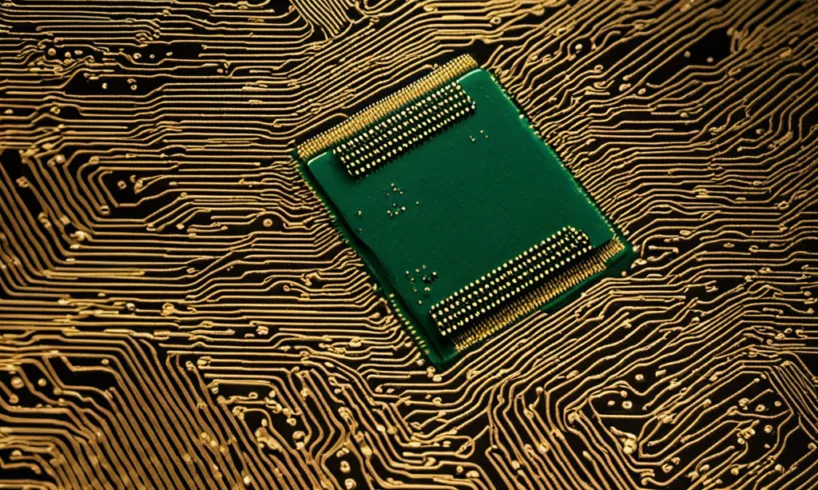
Unveiling the Legal Battle: YMTC vs Micron in High-Stakes Patent War
In a move that could further strain the already tense Sino-American tech relations, Yangtze Memory Technologies Co. (YMTC), one of China's leading semiconductor manufacturers, has launched a major legal offensive against its American counterpart, Micron Technology. The Chinese chipmaker alleges that Micron, a global leader in the memory chip industry, has infringed upon its intellectual property rights. This lawsuit, a new chapter in the ongoing tech war, underscores the escalating competition and friction between the world's two largest economies in the high-stakes semiconductor industry.
This article will delve deep into the details of this legal battle, exploring the specifics of the patent infringement allegations that YMTC has leveled against Micron. It will also examine the broader implications of this lawsuit, particularly how it fits into the ongoing U.S.-China tech rivalry. Additionally, we will consider the potential impact of this case on the global semiconductor market and the tech industry at large. With insights from industry experts, legal analysts, and key stakeholders, we aim to comprehensively understand this critical development in the global tech landscape.
1. Legal Battle Between Tech Giants
The article highlights the escalating legal battle between Chinese chipmaker Yangtze Memory Technologies Co. (YMTC) and its American rival, Micron Technology, Inc. YMTC has filed a lawsuit against Micron, accusing the U.S. firm of patent infringement, signaling a new chapter in the ongoing tech war between the two nations.
2. Allegations of Patent Infringement
YMTC alleges that Micron has infringed upon its patents related to memory storage technology. The Chinese company claims that Micron has violated 13 patents, which could significantly affect the American firm's operations and market share in China.
3. Micron's Stance and Potential Impact
Micron has denied the allegations and is preparing to defend itself vigorously. If found guilty, the company could face financial penalties, and its business in China, one of the largest semiconductor markets, could be severely impacted.
4. Broader Implications for the Tech Industry
This lawsuit underscores the escalating tensions between Chinese and American tech companies amidst the ongoing trade war. It could disrupt the global supply chain and have far-reaching implications for the semiconductor industry.
5. YMTC's Position in the Global Market
Despite being a relatively new player in the semiconductor industry, YMTC has been aggressive in its efforts to break into the global market. This lawsuit against Micron, a seasoned player in the industry, underscores YMTC's ambition and willingness to challenge established players.
Escalating Tensions in the Global Semiconductor Industry
The legal battle between Chinese chipmaker Yangtze Memory Technologies Co. (YMTC) and its U.S. rival Micron Technology is a glaring example of the escalating tensions in the global semiconductor industry. This trend is characterized by a growing number of patent infringement lawsuits as companies fiercely compete for dominance in the market.
YMTC's lawsuit against Micron, alleging the U.S. firm infringed on its NAND memory chip patents, is a significant development. This is because American and Korean companies have traditionally dominated the semiconductor industry. Chinese firms like YMTC have invested heavily in research and development to catch up and challenge this status quo.
The implication is clear: the global semiconductor industry is getting more competitive and litigious. As the industry continues to evolve with the advent of new technologies like 5G and Artificial Intelligence, companies will increasingly resort to legal means to protect their intellectual property rights.
China's Rising Aspirations in the Global Chip Market
The lawsuit also highlights another significant trend: China's rising aspirations in the global chip market. Over the past few years, the Chinese government has been pushing to reduce its dependence on foreign chips and develop its domestic semiconductor industry.
YMTC's legal action against Micron is a bold move that underscores China's determination to establish itself as a global leader in the semiconductor industry. It's not just about protecting its intellectual property rights; it's also about signaling its technological capabilities to the world.
The potential future implications are profound. If China succeeds in its ambitions, it could disrupt the global supply chains and alter the balance of power in the global tech industry. This could lead to a global tech divide, forcing countries to choose sides.
Increasing Geopolitical Influence on the Tech Industry
The YMTC vs. Micron lawsuit underscores the increasing influence of geopolitics on the tech industry. The legal battle comes amid a broader context of the U.S.-China tech war, where both nations are vying for technological supremacy.
This trend is likely to continue, given the strategic importance of the semiconductor industry, which underpins the development of cutting-edge technologies like AI, quantum computing, and autonomous vehicles. As such, the industry has become a battleground for geopolitical tensions, with countries using it to assert their dominance and protect their national security interests.
The future implications are significant. The tech industry could become more fragmented, with different regions having their tech ecosystems. This could lead to a slowdown in global tech innovation due to reduced collaboration and increased duplication of efforts. Furthermore, the rising geopolitical tensions could also lead to more stringent regulations and trade restrictions, impacting the global tech industry's growth.
The Legal Battle Begins: YMTC vs Micron
This section will explore the ongoing legal battle between Yangtze Memory Technologies Co. (YMTC) and Micron Technology Inc. It will cover the specifics of the lawsuit, including the patents in question and the claims made by YMTC. The section will also include a timeline of events, from the lawsuit's initial filing to the most recent developments.
Patents Under Scrutiny: The Technologies at the Heart of the Dispute
This section will thoroughly analyze the specific patents that YMTC alleges Micron has infringed upon. It will detail the technological aspects of these patents, their applications in the semiconductor industry, and the potential implications of these technologies being used without proper licensing or permission.
YMTC: A Closer Look at the Chinese Chipmaker
This section will provide an in-depth profile of YMTC, including its history, position within the global semiconductor industry, and technological capabilities. It will also discuss the company's previous encounters with intellectual property disputes, if any.
Micron's Rebuttal: The U.S. Giant's Defense
This section will detail Micron's response to the lawsuit, including its defense strategy and counterclaims, if any. It will also delve into Micron's patent portfolio and discuss how it may be used in the company's defense.
Industry Implications: What This Means for the Global Semiconductor Market
This section will explore the potential implications of this lawsuit for the global semiconductor industry. It will discuss how a verdict in favor of either party could impact the industry dynamics, the balance of power between U.S. and Chinese tech companies, and the future of innovation in the industry.
Legal Precedents: Similar Cases in the Tech Industry
This section will examine similar patent infringement cases in the tech industry and how they were resolved. It will analyze these cases for potential insights into how the YMTC vs. Micron lawsuit might play out and what it could mean for future patent disputes in the tech industry.
Expert Opinions: What the Legal and Tech Experts Say
This section will feature interviews with legal experts and industry analysts, providing their views on the lawsuit, its potential outcomes, and its implications for the tech industry. It will provide a balanced view, featuring opinions from both sides. Error communicating with OpenAI: (‘Connection aborted.', RemoteDisconnected(‘Remote end closed connection without response'))
Error communicating with OpenAI: (‘Connection aborted.', RemoteDisconnected(‘Remote end closed connection without response'))
Misconception 1: YMTC's Lawsuit is a Direct Consequence of the U.S.-China Trade War
Contrary to popular belief, YMTC's lawsuit against Micron does not directly result from the ongoing U.S.-China trade war. While the trade tensions may have heightened the competitive landscape, the lawsuit stems from allegations of patent infringement. YMTC claims Micron has infringed upon its intellectual property rights related to memory storage technology. This legal action likely occurred irrespective of the geopolitical climate, as companies often resort to litigation to protect their proprietary technology.
Misconception 2: Micron is the Sole Victim of Chinese Tech Companies' Patent Lawsuits
While Micron is currently in the spotlight due to YMTC's lawsuit, it is not the only U.S. tech firm that Chinese companies have targeted for alleged patent infringements. In the past, other tech giants such as Qualcomm and Apple have also faced similar lawsuits from Chinese firms. This misconception stems from the high-profile nature of the Micron-YMTC case and the current focus on the U.S.-China tech rivalry. However, it's crucial to understand that patent lawsuits are common in the tech industry worldwide and are not exclusive to U.S. or Chinese companies.
Misconception 3: YMTC is a Copycat of Western Technology
Another misconception is that YMTC, like many Chinese tech firms, merely replicates Western technology. This view is overly simplistic and fails to acknowledge Chinese tech companies' significant strides in innovation and research. YMTC, for instance, has invested heavily in research and development, earning it a place among the world's leading memory chip makers. The company's 3D NAND technology, at the heart of the dispute with Micron, is a testament to its innovative capabilities. While it's true that some Chinese tech firms have been accused of intellectual property theft, it's unfair and inaccurate to label all of them as mere copycats.
A New Chapter in Tech Rivalry
The ongoing legal battle between Chinese chipmaker Yangtze Memory Technologies Co. (YMTC) and U.S. tech giant Micron Technology, Inc. represents a significant escalation in the global semiconductor industry's patent wars. YMTC's bold move to sue Micron over alleged patent infringement underscores the intense competition in the high-stakes world of memory chip production. This conflict also highlights the broader geopolitical tensions between the U.S. and China as each nation seeks to secure its dominance in critical technology sectors.
The outcome of this lawsuit could have far-reaching implications for the global tech industry. If YMTC prevails, it could disrupt Micron's operations and alter the competitive landscape of the semiconductor industry. On the contrary, if Micron emerges victorious, it could reinforce the strength of U.S. patent laws and deter potential infringers. Regardless of the outcome, this case is a stark reminder of the high stakes in the global tech race and the lengths companies are willing to go to protect their intellectual property.

George Smith, with over a decade in tech journalism, excels in breaking down emerging tech trends. His work, spanning tech blogs and print, combines in-depth analysis with clarity, appealing to a wide readership. George's pieces often explore technology's societal impact, showcasing his foresight in industry trends.






